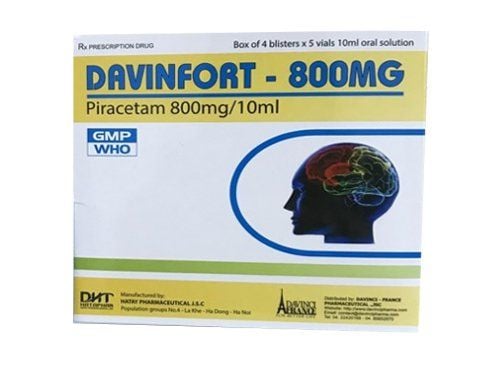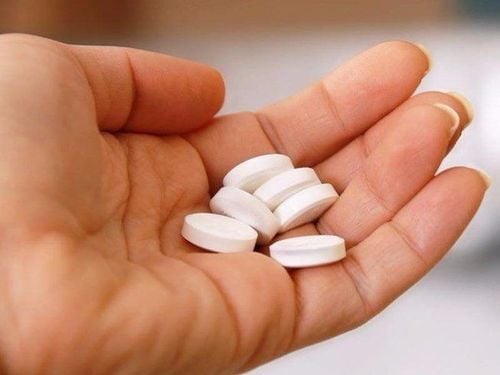This is an automatically translated article.
Valproate Sodium is a psychotropic drug, with the main ingredient being Valproate Sodium. This drug is often indicated in the treatment of epilepsy, but during the use of Valproat Sodium, you may encounter some side effects such as digestive disorders, taste changes, decreased liver function, etc. ..
1. What is Valproate Sodium?
Valproate Sodium is classified as a psychotropic drug, has the international name Sodium valproate, the main active ingredient is Valproate Sodium. The brand-name forms of Valproat Sodium include: Sodium Valproate Aguettant, Dalekine Syrup, Braiporin syrup, Dalekine 500, Dalekine, Milepsy 200.
Dosage form and packing:
Enteric-soluble capsules with concentrations of 150mg, 20mg, 300mg, 500mg Syrup form 250mg/5ml (50ml vial) Solution for intravenous injection: 100mg/ml, tube 5ml.
2. What are the effects of Valproate Sodium?
Pharmacodynamics: After oral administration, Valproate Sodium is dissociated into valproate ion in the gastrointestinal tract. Valproate Sodium has antiepileptic effects through gamma-aminobutyric acid (GABA – a neurotransmitter inhibitor). It can increase the concentration of GABA by two mechanisms: inhibiting GABA metabolism or increasing GABA activity. Therefore, Valproat Sodium is indicated in the treatment of many different types of epilepsy.
Pharmacokinetics:
Absorption: Valproate Sodium is rapidly absorbed after oral administration. Plasma concentrations peak approximately 1 to 4 hours after oral administration or 1 hour after intravenous infusion. The therapeutic effect is evident from a few days to a week of taking the drug. The bioavailability of Valproate Sodium is similar in extended-release tablets and normal capsules. Distribution: Approximately 90% of Valproate Sodium is bound to plasma proteins. Metabolism: The liver is the major site of metabolism of Valproate Sodium, where it is metabolized to the major metabolites glucuronide conjugates, 2-propyl-3-ceto-pentanoic acid, 2-propyl-hydroxypentanoic acid. Elimination: Valproate Sodium is eliminated mainly in the urine.
3. Indications and contraindications of Valproat Sodium
Valproat sodium is indicated in the following cases:
Generalized seizures: convulsion, tonicity, myoclonic seizure, absence of consciousness, tonic-clonic seizures, ataxia. Local seizures. Lennox-Gastaut syndrome, West syndrome. Prevention and treatment of manic episodes. Febrile convulsions in children. Contraindications: Absolutely do not use Valproate Sodium in the following cases:
Allergy to valproate Acute and chronic hepatitis or a personal or family history of hepatitis Severe liver failure Urea cycle disorder Disorders porphyrin metabolism. Alpers-Huttenlocher syndrome (mutation in the gene encoding the enzyme γ-polymerase that disrupts mitochondria)
4. Dosage and how to use Valproate Sodium
You need to absolutely follow the doctor's instructions on the dose and use. Do not arbitrarily change the dose, the medication as well as give Valproat Sodium to others to take even if they have the same symptoms as you.
Dosage:
Adults
Oral form:
Epilepsy (convulsions): 250mg/day in divided doses. Partial seizures: 10-15 mg/kg/day. Increase by 5 - 10 mg/kg/day at weekly intervals to achieve an appropriate therapeutic dose, up to a maximum of 60 mg/kg/day. Absence of consciousness: 15 mg/kg/day. Increase by 5 to 10 mg/kg/day at weekly intervals until seizures are controlled, up to a maximum of 60 mg/kg/day. When the dose exceeds 200mg/day, it should be divided into 2 or more doses. Manic episodes: 750mg/day in 2-3 divided doses, gradually increasing the dose to the lowest effective level, up to a maximum of 60mg/kg/day. Migraine prevention: 250mg/day in 2 divided doses, up to 1000mg/day. Intravenous form: slow intravenous infusion of 20 mg/min over 60 minutes. Should be converted to oral form when possible.
Children:
Oral form:
Seizures (convulsions) in children > 10 years old: 10-15mg/kg/day. Increase by 5 to 10 mg/kg/day at weekly intervals to achieve an appropriate therapeutic dose, up to a maximum of 60 mg/kg/day. Migraine prophylaxis: children from 12 years of age take divalproex sodium 250mg/day in 2 divided doses, up to 1g/day. Children over 16 years old take 250mg/day in 2 divided doses, up to 1000mg/day. Intravenous form: anticonvulsant (1-12 years old): 15-45mg/kg/day. Increase by 5 - 10 mg/kg/day at weekly intervals to achieve the appropriate therapeutic dose.
How to use:
Oral form: Patients need to drink the whole tablet with water, do not chew or crush to avoid irritation in the mouth and throat. The patient can take the medicine with meals. Intravenous form: mix with compatible injection solutions, eg Ringer lactate, sodium chloride 0.9%, dextrose 5%. What should I do if I miss a dose of Valproate Sodium?
Take another dose as soon as you remember. If it is almost time for your next dose, skip it and take your next dose as scheduled. Do not take a double dose the next time to make up for the missed dose. What to do in case of an overdose of Valproate Sodium?
Symptoms of overdose that may appear are somnolence, cardiovascular block, deep coma, even death. In case of overdose, you need to immediately go to the nearest medical facility for treatment. Gastric lavage or induction of vomiting depends on the time of administration of the drug. The mainstay of treatment is supportive therapy and maintenance of urine output.
5. Undesirable effects when using Valproat Sodium
During the use of Valproat Sodium, you may encounter unwanted effects such as:
Very common: dizziness, insomnia, headache, nervous tension, hair loss, digestive disorders, thrombocytopenia, decreased visual acuity, muscle tremors, infections, flu-like syndrome. Common: chest pain, palpitations, arrhythmias, peripheral edema, changes in blood pressure, ataxia, abnormal gait, myalgia, hyperreflexia, depression, abnormal thinking, personality disorder, menstrual changes, dry skin, rash, pancreatitis, stomatitis, taste changes, increased liver enzymes, decreased blood protein, ... Uncommon: leukopenia, allergies, disorders behavior, bedwetting, dementia, thrombosis, hemorrhage, anemia, hepatotoxicity, hyperbilirubinemia, etc. The symptoms listed above are not exhaustive. You may experience other unusual symptoms while taking Valproat Sodium. Please notify your doctor immediately for advice and guidance.
6. Drug interactions
The phenomenon of drug interactions can change the absorption capacity as well as the effects and side effects of the drug. Therefore, please list all medications you are using, including prescription and non-prescription drugs, dietary supplements, vitamins, ... and inform your doctor. Drugs that may interact with Valproate Sodium drugs such as:
Tricyclic antidepressants, barbiturates, risperidone, ethosuximide, rufinamide, vorinostat, zidovudine, primidone. Chlorpromazine, topiramate, felbamate, salicylate. Aminocamptothecin, oxcarbazepine, phenytoin, carbamazepine.
7. Some notes when using Valproat Sodium
Pregnant women: Valproate Sodium causes reproductive toxicity (malformations, teratogenicity, abnormal blood coagulation, liver failure leading to death). Therefore, avoid taking this medicine during pregnancy.
Lactating women: Valproate Sodium passes into breast milk, so breast-feeding should be stopped if the mother is taking this medicine.
Some other notes:
Valproat Sodium causes depression of the nervous system, so you should not drive, operate machinery or work at height while taking this medicine. Caution should be exercised when using Valproate Sodium in patients with a history of liver disease, taking multiple anticonvulsants, children with congenital metabolic disorders, severe epilepsy with mental retardation. Discontinue the drug if pancreatitis occurs. When uremia is detected and the urea cycle disorder is detected, the drug should be discontinued. Keep Valproat Sodium in sealed packaging, in a dry place, the best temperature is from 15-25 degrees Celsius, avoid direct light. Keep medicine out of reach of children and pets.
Follow Vinmec International General Hospital website to get more health, nutrition and beauty information to protect the health of yourself and your loved ones in your family.
Please dial HOTLINE for more information or register for an appointment HERE. Download MyVinmec app to make appointments faster and to manage your bookings easily.













